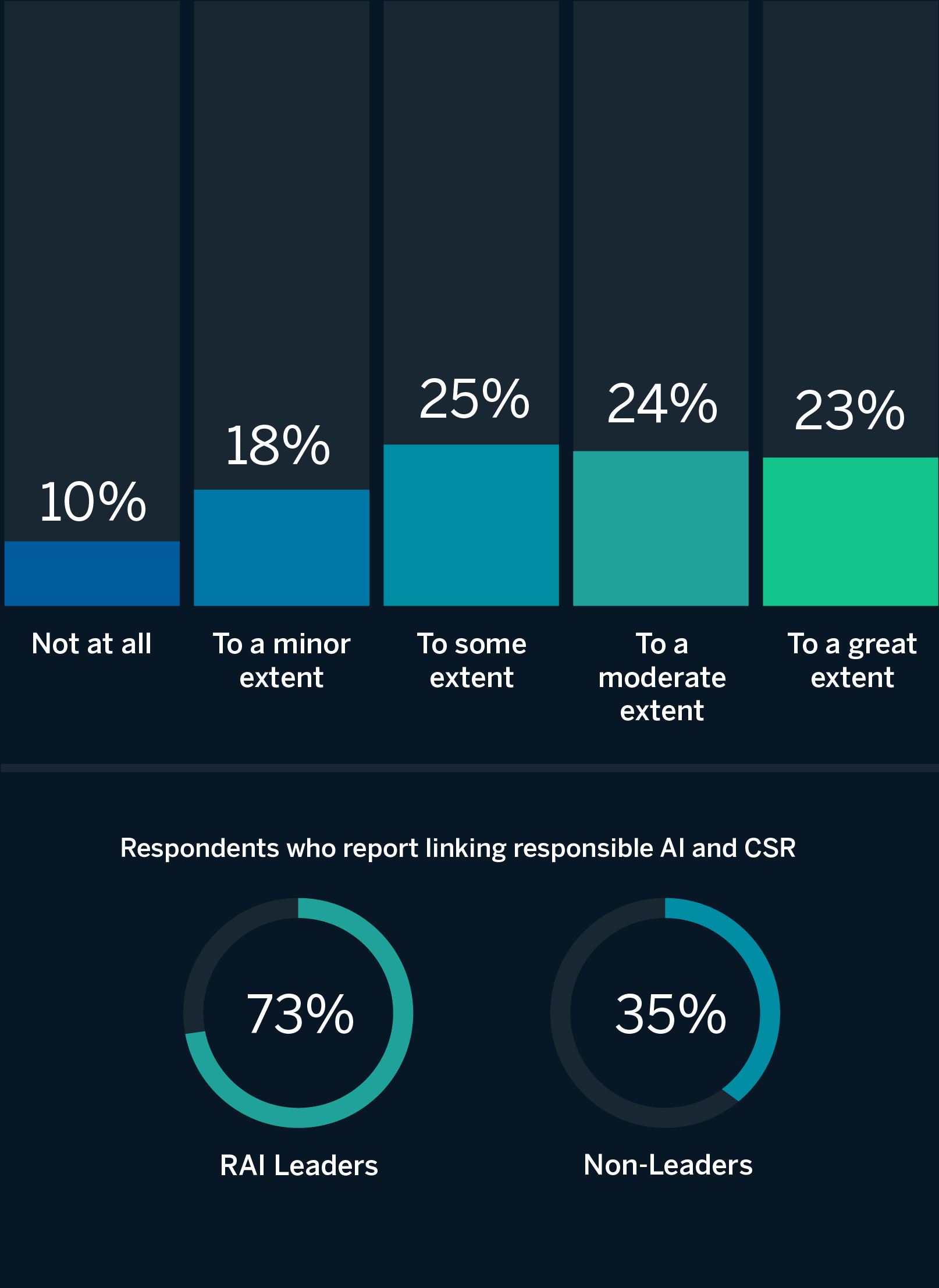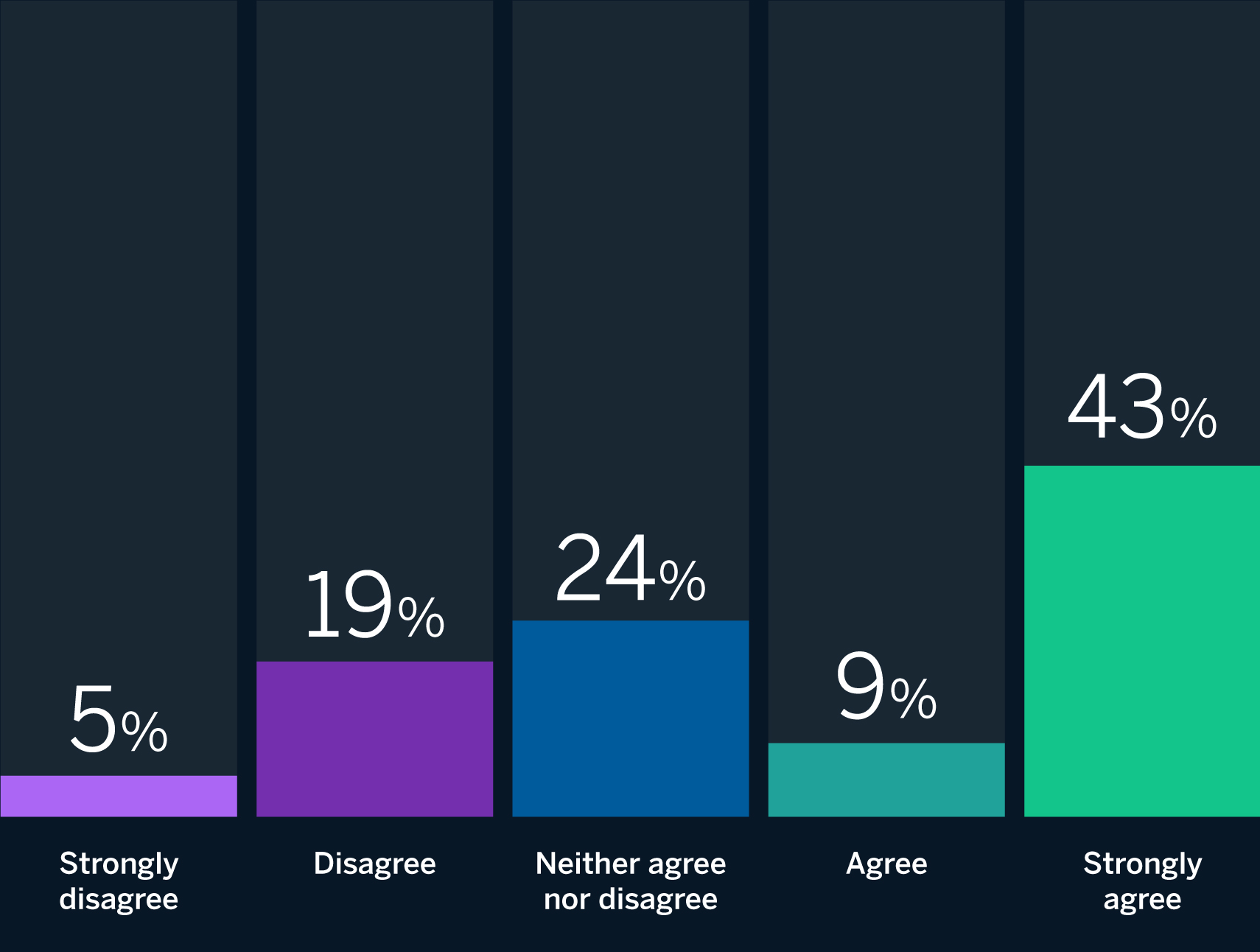Should Organizations Link Responsible AI and Corporate Social Responsibility? It’s Complicated.
Topics
Responsible AI
In collaboration with
BCGMIT Sloan Management Review and Boston Consulting Group (BCG) have assembled an international panel of AI experts that includes academics and practitioners to help us gain insights into how responsible artificial intelligence (RAI) is being implemented in organizations worldwide. This month’s question for our panelists: Should an organization tie its RAI efforts to its overall corporate social responsibility (CSR) efforts? The results present a mixed picture. While 52% of panelists (11 out of 21) believe that an organization’s RAI and CSR efforts should be linked, 24% do not (5 out of 21 disagree or strongly disagree), and an equal percentage expressed ambivalence (5 out of 21 neither agree nor disagree). Despite the lack of consensus, there are some common characteristics among those who agree that organizations should link their RAI and CSR efforts, as well as some concerns shared among the remaining panelists.
We also conducted a global survey of more than 1,000 executives to inquire about a similar question — the extent to which they believe their organization’s RAI and CSR efforts are actually linked in practice.1 An overwhelming majority of survey respondents — 90% of managers in companies with at least $100 million in annual revenues — reported that their organization’s RAI and CSR efforts are linked, albeit to varying degrees (23% to a great extent, 24% to a moderate extent, 25% to some extent, and 18% to a minor extent). Among RAI Leaders, 73% reported links between the two (strongly agree/agree), compared with only 35% of non-Leaders.
Only 10% of managers surveyed reported no connection at all between the two. While the question posed to our panelists was a normative one and the question posed to survey respondents was an empirical one, the divergence between survey and panel results might also be attributable to the wide variety of opinions we outline in this article as to what RAI and CSR encompass.
The Panelists Respond
Organizations should tie their responsible AI efforts to their corporate social responsibility efforts.
Fifty-two percent of our expert panelists agree.
Source: Responsible AI panel of 21 experts in artificial intelligence strategy.
Responses from the 2022 Global Executive Survey
Ninety percent of managers in companies with at least $100 million in annual revenues report that their organization’s RAI and CSR efforts are linked.

Source: MIT SMR survey data excluding respondents from Africa and China combined with Africa and China supplement data fielded in-country; n=1,202.
Below, we share some of the insights of our RAI panelists. Then, drawing on our panelist responses and our own experience working with RAI initiatives, we offer three practical considerations for organizations weighing whether to link their RAI and CSR efforts.
Reasons to Connect Responsible AI and CSR
A slight majority of our panelists (52%) believe that organizations should tie their RAI efforts to their CSR efforts. But their responses reflect two distinct rationales for doing so based on (1) the inherent alignment between RAI and CSR, and (2) the instrumental value of linking RAI to CSR efforts.
Inherent Alignment Between RAI and CSR
Among the panelists who highlighted the inherent alignment between RAI and CSR principles and objectives is Nitzan Mekel-Bobrov, chief AI officer at eBay. As he explains, “Many of the core ideas behind responsible AI, such as bias prevention, transparency, and fairness, are already aligned with the fundamental principles of corporate social responsibility, so it should already feel natural for an organization to tie in its AI efforts.” For example, as Linda Leopold, head of responsible AI and data at H&M Group, notes, “There is a close connection between responsible AI and efforts to promote social and environmental sustainability.”
Similarly, Vipin Gopal, chief data and analytics officer at Eli Lilly, adds, “Many dimensions of responsible AI reflect companies’ accountability to themselves and to their stakeholders and hence are fundamentally linked to CSR.” Finally, in thinking about CSR and related environmental, social, and governance (ESG) objectives, Richard Benjamins, chief AI and data strategist at Telefónica, observes that “in organizations that use AI at scale, there is a close connection to all ESG elements.”2
Instrumental Value of Linking RAI to CSR
Beyond the inherent alignment between RAI and CSR, several panelists highlighted more instrumental or pragmatic reasons for linking them. Aisha Naseer, director of research at Huawei Technologies Co. (UK), argues the two must work in tandem: “From an organizational perspective, the practical implementation of the responsible AI initiative needs to be closely aligned to corporate social responsibility efforts” in order to “steer responsible business outcomes.” Situating RAI in the broader context of an organization’s social license to operate AI, Katia Walsh, chief global strategy and AI officer at Levi Strauss & Co., contends, “For digital transformation efforts to be successful, they need to be in service to business drivers that will enable and protect a company’s right to operate in the future, including corporate social responsibility priorities.”
On the flip side, the instrumental view also suggests that not linking RAI to CSR could harm an organization. Oarabile Mudongo, a researcher at the Center for AI and Digital Policy, reinforces the idea that RAI is central to protecting a company’s right to operate. He cautions, “By establishing corporate social responsibility efforts, these businesses can demonstrate that effectively developing and embedding ethical AI is not just a bonus and that failing to do so may be a significant liability to business operations.”
Strongly agree
Cautions
Whether respondents agree or do not agree with our statement, the key point that emerged is that there isn’t a one-size-fits-all answer. Panelists identified two primary considerations that affect whether an organization should link its RAI and CSR efforts: its use of AI, and the strength of its CSR initiative.
Several panelists who expressed ambivalence suggested that the answer depends on an organization’s use of AI, including its level of AI maturity. As Slawek Kierner, senior vice president of digital health and analytics at Humana, puts it, “Every company likely needs to find its unique answer depending on its industry and state of maturity in AI and ESG.” For Jaya Kolhatkar, chief data officer at Hulu, “Tying responsible AI efforts to a company’s corporate social responsibility efforts is largely dependent on whether a company’s use of AI is linked to its social responsibility. Each company needs to evaluate this relationship on a case-by-case basis based on the company’s charter.” Finally, Philip Dawson, a fellow at the Schwartz Reisman Institute for Technology and Society, argues that linking RAI to CSR is less important than “establishing RAI policies and practices that are understood first and foremost as a proactive response to emerging legal, governance, and technical standards and an authentic expression of corporate values.”
Disagree
“Responsible AI should be a requirement for every model built. It should be exercised as a matter of course, just as building a safe workspace is necessary as a matter of course. It is independent of the larger corporate social responsibility efforts — which are often targeted at specific efforts.”
Panelists also expressed concerns about tying RAI to CSR if CSR is weak within an organization. As Simon Chesterman, senior director of AI governance at the National University of Singapore, explains, “One of the longstanding concerns about corporate social responsibility was that it would locate questions of accountability in the marketing department rather than the legal or compliance department.” Similarly, Carnegie Mellon associate professor of business ethics Tae Wan Kim observes, “It’s true that ethics can be used as a strategy for reputation management, and companies do so under the name of CSR. However, such a perspective is insufficient. Take Enron, for example, a company that was engaged in several philanthropic (beyond duty) activities while it was also recklessly infringing upon ethical duties around deception and manipulation.”
Kim also notes that while CSR efforts are often concerned with a company’s reputation, perception, and image and therefore must be visible to customers, “much of responsible AI efforts is technical and difficult to explain to customers” and therefore lacks the same external motivations. Finally, Steven Vosloo, digital policy specialist in UNICEF’s Office of Global Insight and Policy, worries about the transience of CSR priorities, noting, “Corporate social responsibility efforts can change as companies focus on different issues over time, whereas responsible AI is an evergreen issue that needs to be anchored in the core functioning of the organization.”
Agree
“While I believe that AI practices should align with an organization’s corporate social responsibility efforts, it really depends on how seriously CSR is taken within an organization and whether it is used to help set the organization’s priorities. I have seen many examples where CSR is not integrated strongly into corporate decision-making, so for that reason, I don’t think that responsible AI should be tied to CSR. Ideally, responsible AI is tied to an organization’s established environmental, social, and governance objectives, with regular and transparent reporting against these objectives in a strong CSR function.”
Bridging the Gap
With these cautions in mind, leaders should consider the following when determining whether to tie their RAI efforts to their CSR efforts:
- Consider organizational culture. Given the inherent alignment and instrumental value in linking RAI and CSR efforts, consider the broader organizational culture, including your attitudes toward innovation, digital transformation, and other business outcomes. If your organization is highly purpose-driven, it might make sense to link them.
- Account for AI use and level of AI maturity. If AI maturity levels are high and AI use is linked to your social responsibility, it might be beneficial to link your RAI and CSR efforts.
- Assess the strength of your CSR efforts. If your CSR initiatives are strong, it might be beneficial to link RAI with them due to the inherent alignment and instrumental value in doing so. However, if CSR is a weak link, you might want to reconsider.
References
1. The survey question was, “To what extent are your organization’s responsible AI initiatives connected to its corporate social responsibility efforts?”
2. CSR and ESG share overlapping objectives but are distinct. See M. Dean, “CSR vs. ESG: Making the Case for Measurable Sustainability,” Thomas, accessed May 4, 2022, www.thomasnet.com. Andrew Winston offers an insightful discussion of the emergence of ESG and how the term and its use relate to sustainability. See A. Winston, “What’s Lost When We Talk About ‘ESG’ and Not ‘Sustainability’,” MIT Sloan Management Review, May 5, 2022, https://dev03.mitsmr.io.





“Beyond designing AI-based solutions, organizations involved in responsible AI establish a close relationship between solutions and society by incorporating values that place humans at the center of development. In such a context, people are more likely to use, trust, and recommend the products: The organization is accountable and can get a lion’s share of the market. Furthermore, through this relationship, the organization is more aware of society’s needs and concerns and is therefore able to produce solutions that matter to it. This is a key to business success and innovation.”